Advisory board and faculty
Initially cofounded in 1991 by Dr. Richard Schroth and Chunka Mui of Computer Science Corporation (CSC), the group, then called Vanguard, has evolved over the years. Prior to 2020, programs were developed and led by its advisory board, which over time comprised John Perry Barlow, Gordon Bell, Maria Bezaitis, Peter Cochrane, Deborah Estrin, Eric Haseltine, Michael Hawley, Ken Hertz, Krisztina “Z” Holly, Alan Kay, Len Kleinrock, Doug Lenat, Ellen Levy, Bob Lucky, Nicholas Negroponte, David Reed, Clay Shirky, Larry Smarr, and Eben Upton.
From 2020 onward, the following editorial advisory board members guide the program: Steven Cherry, Stephen DeAngelis, Dan Gould, Krisztina "Z" Holly, Len Kleinrock, Ellen Levy, John Miranda, Ike Nassi, Martin Reeves, Jennifer Sample, K Krasnow Waterman, Geoffrey West, and Laurie Yoler.
They identify thought leaders and innovators from a multiplicity of backgrounds and disciplines to speak at TTI/Vanguard meetings.
Conferences
Each TTI/Vanguard conference lasts two days and features workshops and optional field trips to local academic and corporate R&D labs. Conference recordings and documents are promptly archived in a repository accessible to TTI/Vanguard members only.
Speakers
TTI/Vanguard’s presenters include technologists, entrepreneurs, academicians, scientists, futurists, authors, journalists, and business leaders.
TTI/Vanguard conferences are interactive.
Author David Weinberger has described his experience as a speaker as follows:
"Everyone in the audience has a microphone and is encouraged to interrupt with questions and disagreements. So, I didn't make it all the way through my talk, which is common here. Unsurprisingly, the comments were quite trenchant. ... I should have figured more audience-conversation time into my talk. I was well into describing tagging when the big red light flashed, and I didn't get to the conclusions I outlined in my previous post." [2]
According to another speaker, Dr. Paul Miller:
"The audience is senior, and easily one of the most engaged I've come across for a while. After a ten-minute grace period, presenters are pelted with questions and comments, and I've only seen a couple get all the way through their prepared slides. It's refreshing to see attendees making sure they get what they want, rather than listening semi-soporifically to one prepared pitch after another. It should also be good for the speaker, as at least they’re having the audience engage." [3]
Press
TTI/Vanguard is a private forum. No press is permitted in TTI/Vanguard sessions, and it does not publish its findings for the public.
Jeff Jonas, an engineer and scientist who spoke at one of the conferences, stated:
"There is this organization called TTI/Vanguard. I swear I had never heard of them. Based on the roads I travel and the company I keep—I must have been living in a box." [4]
Profile of TTI/Vanguard Member Organizations
TTI/Vanguard member organizations represent global private, public, and academic sectors. Members include brand-name manufacturers, cutting-edge software and hardware developers, aerospace and defense companies, financial and investment institutions, insurers, retailers, pharmaceutical and healthcare groups, telecommunications firms, corporate and government labs, service providers and consulting groups, energy and chemical companies, broadcasters, food and beverage companies, universities, and advisors in international government agencies.
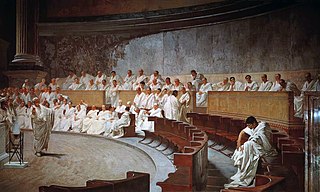
Public speaking, also called oratory or oration, has traditionally meant the act of speaking face to face to a live audience. Today it includes any form of speaking to an audience, including pre-recorded speech delivered over great distance by means of technology.

Leonard Kleinrock is an American computer scientist. A professor at UCLA's Henry Samueli School of Engineering and Applied Science, he made several important contributions to the field of computer science, in particular to the theoretical foundations of data communication in computer networking.

Universiti Teknologi PETRONAS (UTP) is a Malaysian research university established 10 January 1997. It is wholly owned by Petroliam Nasional Berhad (PETRONAS), Malaysia's oil and gas multinational corporation. The campus is built on 400 hectares in the new township of Seri Iskandar, Perak, Malaysia.

Vanguard University of Southern California is a private Christian university in Costa Mesa, California. It was the first four-year college in Orange County. The university offers over 39 undergraduate degrees and emphases in 15 different departments. The university also offers adult-learning programs in its professional studies department and features six graduate degrees. It is accredited by the WASC Senior College and University Commission.

TED Conferences, LLC is an American-Canadian media organization that posts talks online for free distribution under the slogan "ideas worth spreading". TED was conceived by Richard Saul Wurman, who co-founded it with Harry Marks in February 1984 as a conference. It has been held annually since 1990. TED's early emphasis was on technology and design, consistent with its Silicon Valley origins. It has since broadened its perspective to include talks on many scientific, cultural, political, humanitarian, and academic topics. It has been curated by Chris Anderson, a British-American businessman, through the non-profit TED Foundation since July 2019.
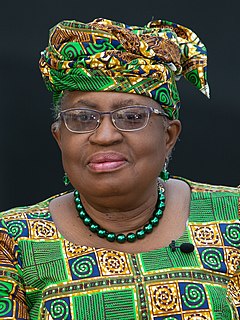
Ngozi Okonjo-Iweala is a Nigerian-American economist, who has been serving as Director-General of the World Trade Organization since March 2021. Notably, she is the first woman and first African to lead the World Trade Organization as Director-General. She sits on boards of: Danone, Standard Chartered Bank, Twitter, MINDS: Mandela Institute for Development Studies, Carnegie Endowment for International Peace, Georgetown Institute for Women, Peace and Security, One Campaign, GAVI: Global Alliance for Vaccines and Immunization, Rockefeller Foundation, R4D: Results for Development, ARC: African Risk Capacity and Earthshot Prize plus others.
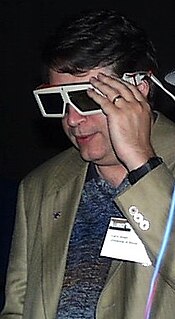
Larry Lee Smarr is a physicist and leader in scientific computing, supercomputer applications, and Internet infrastructure from Missouri. He currently works at the University of California, San Diego. Smarr has been among the most important synthesizers and conductors of innovation, discovery, and commercialization of new technologies – including areas as disparate as the Web browser and personalized medicine. In his career, Smarr has made pioneering breakthroughs in research on black holes, spearheaded the use of supercomputers for academic research, and presided over some of the major innovations that created the modern Internet. For nearly 20 years, he has been building a new model for academic research based on interdisciplinary collaboration.

Michael Jerome Hawley was an American academic and artist working in the field of digital media. Previously at MIT’s Media Laboratory where he was a professor and held the Alexander W. Dreyfoos, Jr. endowed chair, Hawley was the founder or co-founder of several major research programs and projects including MIT's GO Expeditions program, Things That Think, Toys of Tomorrow, Counter Intelligence, and founder of the nonprofit organization Friendly Planet. He notably was the scientific director of the American Expedition on Mount Everest in 1998, one of the first major scientific expeditions on Everest. Hawley's work has been featured in major media such as National Geographic, Time, The New York Times, and on numerous television networks. His work at MIT has, in his own words, “sought to creatively stretch digital infrastructures, embedding intelligence into all sorts of artifacts and advancing the web of communications.”
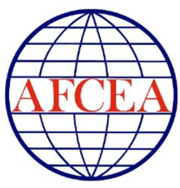
AFCEA International, established in 1946, is a nonprofit membership association serving the military, government, industry, and academia as a forum for advancing professional knowledge and relationships in the fields of communications, information technology, intelligence and global security. AFCEA provides a forum for military, government, academic and industry communities with altogether more than 30,000 members. AFCEA supports local chapters, sponsors events, publishes a magazine, promotes STEM education and provides member benefits.
The Columbia Institute for Tele-Information (CITI) is one of several research centers for Columbia Business School, focusing on strategy, management, and policy issues in telecommunications, computing, and electronic mass media. It aims to address the large and dynamic telecommunications and media industry that has expanded horizontally and vertically drive by technology, entrepreneurship and policy.

Franklin Nathaniel Jonas is an American musician and former child actor.

The Cortland Sport Management Department is an academic department at the State University of New York (SUNY) at Cortland. The department features the only undergraduate and graduate sport management degree programs in the SUNY system. Cortland Sport Management, which has a focus on information technology, digital media in sport, and the internationalization of sport, and prepares students for careers in sport business through a theory-to-practice model of learning. The department houses the Sport Media and Technology Learning Center and the Dartfish USA Northeast Training Center. The student-run Cortland Sport Management Club is one of the largest student organizations on campus.

Strategy+Business is a business magazine focusing on management issues and corporate strategy. Headquartered in New York, it is published by certain member firms of the PricewaterhouseCoopers network. Prior to the separation of Booz & Company from Booz Allen Hamilton in 2008, strategy+business was published by Booz Allen Hamilton, which launched the magazine, then titled Strategy & Business, in 1995. Full issues of strategy+business appear in print and digital edition form on a quarterly basis, and other original material is published daily on its website.
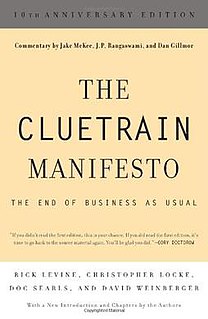
The Cluetrain Manifesto is a work of business literature collaboratively authored by Rick Levine, Christopher Locke, Doc Searls, and David Weinberger. It was first posted to the web in 1999 as a set of ninety-five theses, and was published as a book in 2000 with the theses extended by seven essays. The work examines the impact of the Internet on marketing, claiming that conventional marketing techniques are rendered obsolete by the online "conversations" that consumers have and that companies need to join.

David Weinberger is an American author, technologist, and speaker. Trained as a philosopher, Weinberger's work focuses on how technology — particularly the internet and machine learning — is changing our ideas, with books about the effect of machine learning’s complex models on business strategy and sense of meaning; order and organization in the digital age; the networking of knowledge; the Net's effect on core concepts of self and place; and the shifts in relationships between businesses and their markets.
BoardEx is a global data company specializing in relationship mapping and intelligence.

Microsoft Ignite is an annual conference for developers and IT professionals hosted by Microsoft. It has taken place in several locations around the world. The first conference, then known as TechEd, happened in 1993 in Orlando, Florida, United States. The 2014 TechEd in Barcelona marked the last event using that name. Microsoft altered its conference schedule and introduced the Microsoft Ignite name from 2015 on.
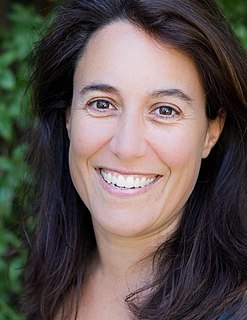
Krisztina Holly, known by her colleagues as 'Z' is a Hungarian American innovator, entrepreneur, and adventurer. She invests in early stage complex science and technology startups as a venture partner with Good Growth Capital and is a speaker, advisor and board member to innovative leaders and corporations.
IEEE Cloud Computing is a global initiative launched by IEEE to promote cloud computing, big data and related technologies, and to provide expertise and resources to individuals and enterprises involved in cloud computing.
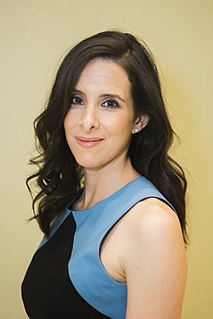
Jessica E. Lessin is an American journalist who serves as editor-in-chief of the technology website The Information, which she founded in December 2013. Lessin had previously spent eight years at The Wall Street Journal covering the technology and media industries.
















